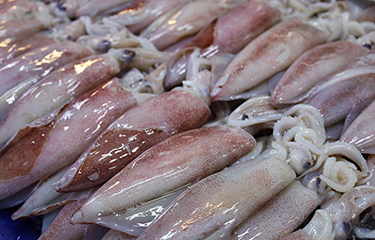Global squid fisheries increased their collective fishing effort by 68 percent over the past three years, and 86 percent of that effort has taken place in unregulated areas of the high seas, according to new research.
The rapid increase has many global fisheries experts concerned about overexploitation of squid stocks, the potential for the expansion of illegal, unreported and unregulated (IUU) fishing, and the fate of small-scale fishers reliant on squid catches to make ends meet.
In March 2023, research published in “Science Advances” titled, “Fishing through the cracks: The unregulated nature of global squid fisheries,” reported that from 2017 to 2020, there was an increase in annual vessel days targeting squid from 149,000 to 251,000 and a total of 4.4 million hours of fishing time, largely in unregulated areas.
The study emphasized the need for regulatory bodies, including regional fisheries management organizations (RFMOs), to close the gap of fragmented regulation among squid fisheries to address species health, workers’ rights, and concerns regarding local equity issues.
“While many other commercial fish stocks face ever-mounting pressure from a growing industrial fishing fleet, along with threats to habitat from pollution, climate change, and coastal development, many of those stocks are regulated, meaning their long-term sustainability is monitored and adjustments to catch limits and other policies can be made when the data show action is needed,” Global Fishing Watch Head of Applied Research Nate Miller said. “Our study suggests that actors may take advantage of fragmented regulations to maximize resource extraction, putting additional stress on the fishery where there is limited oversight.”
Squid fishing typically occurs at night with bright lights to entice squid to rise to the surface, which fishing lures then snag. The study's calculations of squid-fishing efforts involved the use of satellite tracking with visible infrared imaging radiometer suite (VIIRS) data able to detect the bright lights used by squid-jiggers. Automatic information system (AIS) tracking data then overlaid the VIIRS data, tracking vessel movements to study fishing activity.
The research, completed in partnership with the Global Fishing Watch, the University of California Santa Cruz, the Australian National Centre for Ocean Resources and Security at the University of Wollongong, and the Japan Fisheries Research and Education Agency, found that while technically legal, unregulated squid fishing poses a possibly major threat to environmental and social welfare. Primary among those is the overexploitation of global squid resources.
“We highlight that there is global and regional evidence that squid populations are declining, including in the southwest Atlantic Ocean off Argentina, the Pacific Ocean around the Galapagos Islands, and the northwest Indian Ocean, outside the waters of Oman and Yemen,” Miller said.
Squid-fishing vessels are highly mobile, traveling to multiple regions of open ocean every year. Transshipment is also a common occurrence, a process that allows squid-fishing vessels to stay at sea from three months to one year at a time. As a result, vessels often employ questionable human rights and labor practices such as 20-hour workdays, physical abuse, and other concerning actions, as well as near-constant fishing and underreporting of catch due to a lack of regulatory oversight.
According to Miller, unregulated fishing zones are often directly adjacent to regulated spaces, such as economic exclusive zones. The movement of marine species over these boundaries can lead to competition between small artisanal fishing vessels and industrial-sized vessels.
“Unregulated fishing therefore exacerbates inequity for traditional and small-scale fishers, as well as for developing coastal states that depend on revenue from commercial fishing. In many cases, unregulated catch is not reported or incorporated into estimates of fishing effort, harvest, or stock status, making it difficult to ascertain whether the fishing is sustainable,” Miller said.
The study recommends a ...
Photo courtesy of kaninw/Shutterstock








